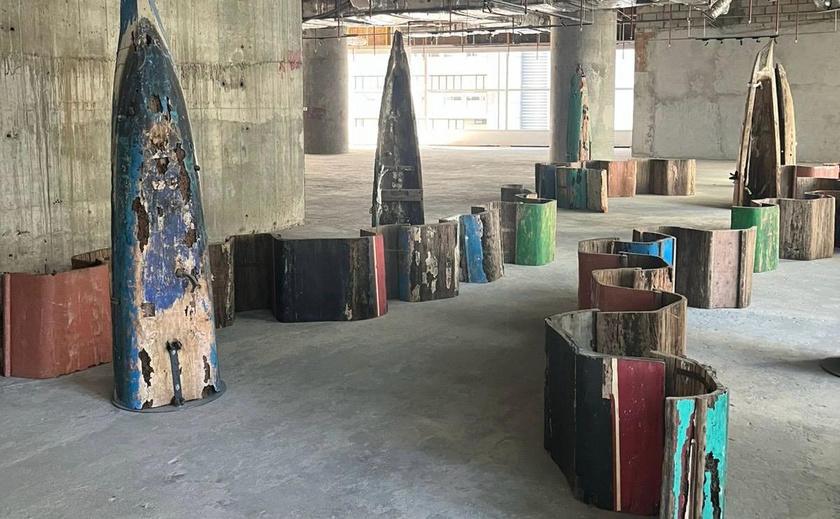Upcoming Exhibition
KoreanABOUT THE ARTIST

Pete Jimenez
(b. 1960- Philippines)
He has held over 24 solo exhibitions and participated in numerous group shows across Manila, Singapore, and Kuala Lumpur. His notable installations include HINDI KEVLAR (2018), presented at the first Manila Biennale, which featured over 300 military helmets. In 2024, his exhibition Travel Light at Artinformal Gallery utilized refurbished cement bags illuminated from within to convey themes of simplicity and release from material excess.
Most recently, his exhibition Hard Rain (2025) at the Drawing Room in Manila featured over a hundred decommissioned bomb shells collected from Nueva Vizcaya and Ifugao. Jimenez welded springs, wheels, and ornamental fragments onto these remnants of war, reshaping them into poetic objects that resemble wind chimes or children’s mobiles. Referencing Bob Dylan’s “Masters of War”, the work reclaims instruments of destruction as expressions of peace and reflection, confronting hidden wartime histories while meditating on humanity’s capacity to both destroy and create.

Hard Rain, 2025
Recycled steel shells from historical ordnance, cleaned and rendered safe for artistic display
Total 180 pieces, installation 14 m length
Hard Rain is an installation composed of more than a
hundred rusted steel scrap components from
decommissioned WWII artifacts. These inert reclaimed
steel casings from historical military equipment, carefully
cleaned and rendered safe, were collected over a decade
from Nueva Vizcaya and the Ifugao Province in the
Philippines. Local villagers unearthed recycled steel shells
from historical ordnance and dismantled vessels from
WWII-era scrap metal, selling them to antique pickers for
modest earnings that often helped meet daily needs.
Through this work, the artist transforms remnants of conflict
into a contemplative sculptural field - a landscape where
the traces of war are reconfigured into gestures of
resilience and renewal. What were once instruments of
destruction are now reassembled as symbols of survival,
reclaiming material histories through the act of making.

Tall Order 5, 2025
Wood and steel, 229 x 61 x 61 cm
Pete Jimenez transforms canoe-like dugouts of Bulakeño fisherfolk
into monumental forms in TALL ORDER. Through these weathered
vessels, he reflects on our deep reliance on water-both gift and
trial-while evoking struggles of survival, adaptability, and co
existence. The work also gestures toward tensions in disputed
waters, where human resilience confronts poverty, conflict, and the
will to endure.
Jimenez’s boats are not pristine relics but weathered, chipped, and
blistered vessels, their surfaces bearing scars of use and decay. He
sources them from fishing villages in Bulacan and Pampanga,
cutting and recomposing fragments into towering
sculptures that hover between memory and myth. In this
reconfiguration, each dugout becomes a symbolic locus-anchored in
community traditions of riverine life yet reaching into broader
narratives of territorial claim, ecological precarity, and the invisible
currents that bind people to place. His practice, rooted in repurposed
industrial and maritime detritus, underscores how cultural resilience
emerges from the margins and margins of circulation.
